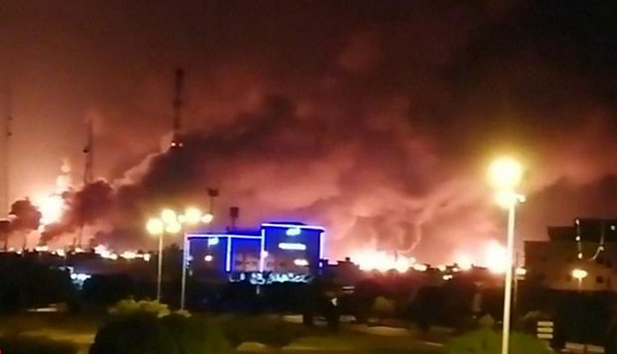The posts are here if you need a catch up on the attacks:
- Drone attacks cut as much as 5mbpd of Saudi oil production
- It could be 'weeks' before Saudi oil production returns to full capacity
- Goldman Sachs oil price forecasts after the Saudi attack
- Platts on the oil price impact of the Saudi attack
- CAD, yen both higher in thin Monday opening forex markets
- Images released of the extensive damage to Saudi production facilities
- Can Saudi Arabia restore almost half the oil production within just days?
- UBS on oil after the attack on Saudi production facilities
- Is a US SPR oil release imminent? No, say analysts
- Here we go - Trump says will authorise SPR oil release if needed
- Oil prices surge as futures trade commences for the week, Stock index futures open lower.
- More on those Goldman Sachs oil price forecasts after the Saudi attack
- Oil - Citi says one key takeaway from the Saudi attacks
- Trump says locked and loaded for response to attack on Saudi oil
In summary:
- The attack has damaged the world's biggest petroleum-processing facility
- It has removed over half of the country's production
- In addition it has removed almost all spare capacity which was previously available - this reduces supply ability to respond to any further major disruption in oil supplies across the globe
- Attack will cut 5.7 m bbls /day of Saudi crude output (more than 5% of the world supply)
- Attack curtails the ability to use spare oil production capacity it held in reserve by the Saudis, about 2 m bbls / day - i.e. spare capacity can not now be ramped up quickly (prior to the attack Saudi had around 2.25 m bbls/day of spare capacity, of the 3.2 m bbls / day globally)
Spare capacity can be brought online from:
- Kuwait
- United Arab Emirates
- Iraq
- Angola
But this is limited (under 1 million bbl / day in total).
Russia is already pumping close to capacity.
- There is spare capacity in Iran …. but they are prohibited from selling due to sanctions. Iran is thought likely to be behind the attacks so [prospects for lifting sanctions have diminished.
- Venezuela is also subject to US sanctions nd industry there is unlikely to be able to meaningfully boost production quickly regardless
US shale?
- expect a quick response (measured in weeks and months) where possible to increase output
- there are bottlenecks at export location ports which will constrain some of this from supplying the rest of the world
Saudi Arabia, the US and China all have oil in strategic storage. In the US there is a big supply, with many analysts saying there is an over supply. This may come in handy in the weeks ahead.
What to watch for ahead is any other supply disruption. If you read above you'll note that this could well be an issue.




